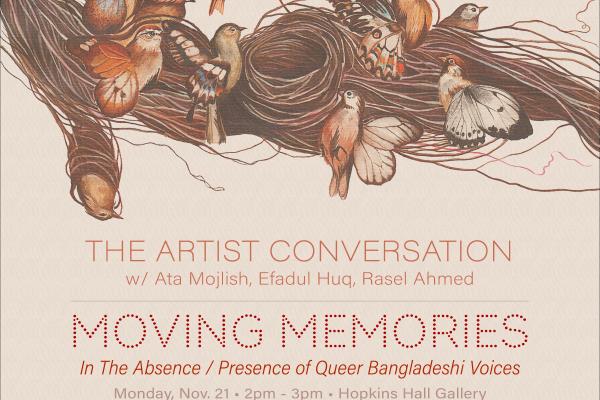
Moving Memories: In the Absence/Presence of Queer Bangladeshi Voices
Panel Discussion at Hopkins Hall Gallery on Monday, November 21 from 2 PM-3 PM
Dipankar Singha (Ankur Sinha), Rasel Ahmed, Ata Mojilish, Efadul Huq; South Asian American Digital Archive
In this artist/archivist talk, the co-makers of the Moving Memories exhibit will talk about archive as a contested site of colonial trauma, nationalist myth making, and its queer re-imagination by de-centering catalogization of the archive and replacing it with intimacy, care, and collaborative art making.
The talk is co-sponsored by Asian American Studies (AAS), South Asian Studies Initiative (SASI), Department of Theatre, Film, and Media Arts (TFMA), and Department of Women's, Sexuality, and Gender Studies (WSGS).
Moving Memories, created in collaboration with South Asian American Digital Archive (SAADA), is an oral history project that tells narratives of queer displacement and homemaking of Bangladeshi queer migrants residing in the U.S. Moving Memories contains interviews with two groups. The first includes Bangladeshi queer migrants who moved for various reasons ranging from education, job, and others. The second documents and recovers memories of homemaking and displacement of gay men whose troubled relationship with Bangladesh originates in the 2016 murders of LGBT+ activists by the Al Qaeda of the Indian Subcontinent.
This audiovisual exhibition, activating queer Bangladeshi oral histories, reinterprets the archives of migration, displacement, immigration, and precarious experiences through a fragmented sensory landscape of audios and images. The exhibit makes visible the suppressed histories of queer Bangladeshi lives and challenges dominant notions of pink migration.
The exhibit extends Queer Archives of Bengal Delta’s ongoing archival work with Bangladeshi queer social and political histories. View the full oral histories on SAADA's website.
Artist Bios:
Dipankar Singha (Ankur Sinha) is an artist from Bangladesh. Born in Khulna, he completed his BFA from the Department of Printmaking, Faculty of Fine Arts in the University of Dhaka and MFA from the Department of Graphics/Printmaking from the Visual Art Faculty, Rabindrabharati University, Kolkata under ICCR scholarship. A craftsman by passion, his goal is to tell the stories that influence him and others from his experience and through his arts and crafts. Constantly trying to evolve, his goal is to depict sociopolitical and personal stories through his arts.
Rasel Ahmed is a community-based filmmaker, archivist, and educator. He is the co-founder and editor of the first Bangladeshi LGBT magazine Roopbaan. Through his film and political work, Rasel explores the themes of migration, displacement, and exile. He is the co-founder of a community-based archive called Queer Archives of the Bengal Delta. Rasel has an MFA from Columbia University and has recently joined The Ohio State University's Theatre, Film, and Media Arts Department.
Ata Mojlish is a native of Bangladesh and currently lives and works in Austin, Texas. Working with a variety of mediums that include photography, digital reconstruction, video, motion graphics, audio and installations, he researches questions on immigrant displacement, mental health, identity, historic and contemporary political systems of the world and the manifold perceptions of home. In addition to his practice, he also co-founded Ghartera and Cartoon People, two distinct art spaces focused on creating creative outlets in the Bangladeshi community.
Efadul Huq is a poet and urban scholar working on queer urbanism, environmental social movements, and urban political ecology with a geographic focus on South Asia and the United States. Huq co-founded a community-based archive called Queer Archives of the Bengal Delta, which preserves queer social and political memories and artifacts relevant to the Bengal Delta and produces a situated analysis of global gender and sexual politics.
Moving Memories is presented in partnership with Hybrid Arts Lab, a multi-venue learning lab that experiments with how art is imagined, made, viewed and understood within physical and digital spaces.
